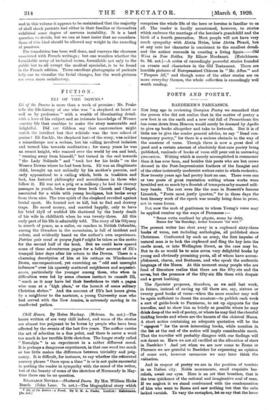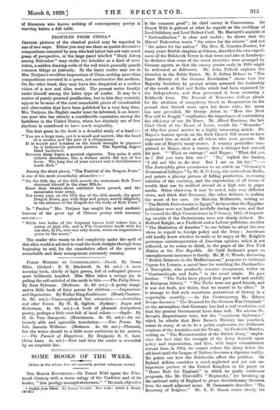POETS AND POETRY.
BAEDEKER'S PARNASSUS.
Nor long ago in reviewing Georgian Poetry we remarked that the person who did not realize that in the matter of poetry a new foot is on the earth and a new vial fall of Promethean fire has come down from Heaven would surely be doomed by Apollo to give up books altogether and take to fretwork. But it is of little use to give the reader general advice, to say " Read con- temporary poetry," for there is a serious obstacle in the way of the amateur of verse. Though there is now a great deal of good and a certain amount of absolutely first-rate poetry being published, vanloads of books of verse still pour out in unceasing procession. Writing which is merely accomplished is commoner than it has ever been, and besides this poets who are but crows dressed in the Post-Impressionist feathers of the Imagist and of the other insistently modernist writers exist in whole rookeries. Now twenty years ago bad poetry hurt no one. There were one or two poets of great reputation writing whose works were heralded not so much bya flourish of trumpets as by massed mili- tary bands. The rest were like the man in Rossetti's famous Limerick, " Poets most justly ignotus," for in those days the best literary work of the epoch was usually being done in prose, not in verse forms.
But now the mob of gentlemen to whom Young's verse may be applied cumber up the ways of Parnassus :— " Some write confined by physic, some by debt, Some for 'tie Sunday, some because 'tis wet."
The present writer has shut away in a cupboard sixty-three books of verse, not including anthologies, all published since Christmas. Confronted by such an army, the first impulse of natural man is to lock the cupboard and fling the key into the castle moat, or into Wellington Street, as the case may be. But to do so would be to miss seven very delightful books by young and obviously promising poets, all of whom have accom- plishment, charm, and freshness, and who speak the authentic language of the Muses. At this moment many people who are fond of literature realize that there are the fifty-six and the seven, but the presence of the fifty-six fills them with despair and a great loathing.
The Spectator proposes, therefore, as we said last week, in future, instead of saving up till there are, say, sixteen or twenty good books of verse—when the mere number may well be again sufficient to daunt the amateur—to publish each week a sort of guide-book to Parnassus, to set up signposts for the traveller, and to show him as briefly as possible where he may drink deepof the well of poetry, or where he may find the cheerful tinkling brooks and where are the haunts of the cloistral Muses. A short notice containing an adequate quotation will be the " signpost " for the most interesting books, while mention in the list at the end of the notice will imply considerable merit. That the traveller will probably disagree with our findings will not daunt us. Have we not all cavilled at the allocation of stars in Baedeker ? And yet when we are new come to Rome or Florence we are grateful to Baedeker for expressing an opinion of some sort, however erroneous we may later think the valuation.
And in respect of poetry we are in the position of tourists in an Italian city. Noble monuments, small exquisite bag- reliefs, await our eyes. Here is an art that breathes, that is the true quiokener of the rational and imaginative soul of man. If we neglect it we stand condemned with the condemnation of him who went to Rome and saw nothing but that the cabs lacked varnish. To vary the metaphor, lotus say that the lower
of literature who knows nothing of contemporary poetry is starving before a full table.











































 Previous page
Previous page